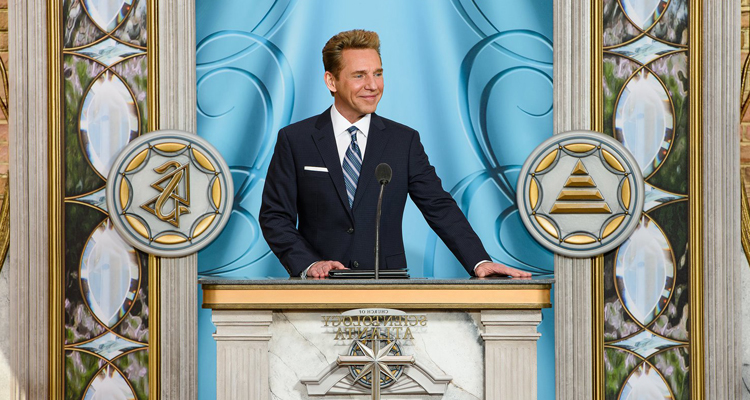Social Issue Essay Sample About Scientology
In the 21st century, people have a wide range of options in what to believe. On the one hand, they can choose traditional monotheistic religions like Christianity, Judaism or Islam. On the other hand, they can choose polytheistic religions that will suit their spiritual needs perfectly. There are still many other options for those, who look for the truth. They can turn to other doctrines, churches or sects, many of which guarantee the salvation of the soul. Still, much more of them promise to release people from all of their troubles. Nowadays Scientology as a modern religion or better to say religious philosophy becomes more and more popular. Founded in 1953 by Ron Hubbard, it still exists and expands today by joining the ranks of the increasing quantity of its followers. Many stars actively promote Scientology doctrine. Famous Scientologists include Tom Cruise, Priscilla Presley, John Travolta, Karen Black, Chick Corea and others.
Scientology philosophy appeals to the modern society with the promise to set it free from its problems. By involving different psychological techniques, it seems to give a real relief, and many people stay within Scientologists’ ranks for many years. However, the question is – is it all for real? Does Scientology really help people to become happy, and if so, what is the price for that happiness? In this work one would get to know about the key elements of Scientology doctrine, its practices and practitioners, what does it suggest to people and what lies behind it. It is an attempt to estimate positive and negative sides of Scientology and define is it true or false religion. As far as Scientology does not have the status of religion worldwide (Scientology as religion is recognized in the Unites States, Spain, Australia, Switzerland and New Zeland), this research would refer to it as a Scientology Church.
Determinations
The founder of Scientology Ron Hubbard invented this word after meaningful thinking process in one of the libraries. Scientology doctrine has some elements borrowed from other religions and philosophies. These include Buddhism, Judaism, Gnosticism, Daoism, Christianity and philosophic views of Nietzsche and Freud.
Principles of Scientology
The main principles of Scientology are the following: people are good inside, but they fight for surviving, which depends on themselves, their friends and their degree of unity with the universe. The fundamental belief of Scientology is that human experience is recorded in the brain as a series of “engrams.” These engrams can remind of themselves in similar situations, but they usually cause inappropriate behavior. With the belief of reincarnation, this philosophy attempts to erase engrams from both past and present lives.
After that, “thetan” gains the ability to become one with God. At the same time, Scientology is open to different interpretations of God and deity. There are no specific dogmas about it and everybody can believe in all he or she wants. The essence of the Supreme Being is revealing differently for individuals with the acquiring of more consciousness and spiritual awareness. To some extent, Theta, the energy of life inherent in all, serves as a substitute of God.
Salvation in Scientology
Followers of Scientology expect to gain two things from it: For that, believers have to go through gradual stages of mental awareness – Pre-Clear, Clear, and finally Operating Thetan. Achieving the last stage allows an Operating Thetan to control energy, time, space, and life. Freedom is achieved at the Bridge to Total freedom through the Scientology practice called “auditing.” The process of auditing looks as follows. One of them is the auditor, and another one is the Pre-Clear. The task of auditor is to address questions to the Pre-Clear, to listen attentively to the answers and to approve it.
The task of Pre-Clear is to look for answers in own mind and voice them. To conduct this procedure correctly, an e-meter is involved. An e-meter (short for electropsychometer) works like the lie detector. This device measures electric oscillations from the skin surface and reflects inner state and subconscious feelings of the human. With the help of e-meter, an auditor detects what really bothers his respondent and helps him or her to get rid of his or her worries. Direct questions help also to reveal undesirable barriers that inhibit, stop or blunt a person’s natural abilities. This procedure helps a person to attain freedom, survival, happiness and more intelligence.
On the way to freedom, happiness and salvation, some difficulties may occur. Suffering is an inherent part of life and Scientologists are ready for that. That is possible only in the constant cooperation between many individuals to free each other in auditing. For that, Scientology has founded many organizations for social improvement. Scientology is deeply convinced that its methodology suits perfectly for mental healing of people.
Morals and ethics mean a lot to Scientologists. Progress on The Bridge involves and allows the achievement of high moral and ethical standards. They are listed in the book Introduction to Scientology Ethics, the main Scientology text on ethics. Ethics means some actions to achieve optimal survival for oneself and the group. According to a moral code of Scientologists, the mistakes one makes are called “overts” (this term is analogous to the notion of sin).
To deal with “overts”, one has to rewrite them on the sheet of paper. If a person hides them from others, they turn to be called “withholds.” “Withholds” as such are very harmful for individual for they detach him from the community. Thus, overts and withholds must be voiced at the auditing sessions. Scientologists usually follow these instructions carefully. They also apply other behavior codes in their lives.
Scientology Church has ministers whose responsibilities are to perform certain religious rites and sacraments, with still primarily function of individual counseling. Scientology has strict distribution of powers. It has auditors that can reach different levels of knowledge, and it depends on their paying capacity. Auditors have to assist others in achieving self-enlightenment and to overcome obstacles to it. As the practitioners, they help others to identify their pre-birth, current, and past-life disorders. Arguments in favor of effectiveness of auditing and other Scientology practices are quite original. Scientology states that its practices have a scientific basis resulted from many years of research. There are many witnesses of the positive results of auditing who claim that it helped them to become happy and successful in every area of their life.
Nevertheless, the earnest of success lays in the strict adherence to the doctrine and necessary practices. It is thought in Scientology that it will only help when used in its pure form as Hubbard intended. Any variation of these techniques is thought to affect negatively Scientology’s effectiveness. By this reason, its adherents are not welcome to change something or to interpret their books in a manner different from the official one. People who apply Hubbard’s techniques, but who are not official members the Church of Scientology are believed to be a part of the “Free Zone”. Scientologists consider their modified practices as illegal and often litigate against them.
What claims Scientology is that it improves the world in which modern people live, and suggests the precise way to find the truth. Its philosophy can be applied to all aspects of life. Its practical profit consists in the improvement of spiritual self-consciousness of the man and setting him free. It promises freedom, self and life improvement. On the other hand, many witnesses refute Scientology statements. Particularly, Stella Forstner and Monica Pignotti are the two most significant witnesses for this research paper. These authors tell about another dark side of Scientology and what price have they paid for their dedication and their quit from the Scientology Church. According to these witnesses, there are many manipulative techniques to involve an individual there and to control him.
Manipulations in Scientology
The first manipulation is usually found on the entering to the ranks of Scientologists. The potential adherents are encouraged to pass a free stress test. This test does not have any scientific authenticity, but it makes an impression of a scientific nature. People tend to get everything that is free. The results of the test usually indicate that that particular respondent is very talented as is supposed to do a brilliant career in some field, but he has some trouble with communication. Of course, the experts of Scientology centers are always ready to help, and that is a manipulation number one. Everybody has some problems with communication and everybody want to overcome them. People in trouble are inclined to accept help even from a stranger if suggested. Thus, people are deceived with the promise of the quick relief that may not even come.
Auditing is another example of the manipulation. Many people of art are attracted by auditing for they believe that this process would help them to undercover and realize their creative potential. Indeed, auditing does not leave a single opportunity fro creativity. While new adepts think they can gain profit from the auditing and think it will be helpful for their mind and spirit, the truth is the opposite. In fact, Scientology Church gains profit from this practice for it gets money and priceless information from the people who share it voluntarily. Auditing is quite expensive and to get to another level of mind awareness adherent have to pay quite a big amount of money. The farther people want to get in their spiritual improvement the more they have to pay. Through this practice, auditors get any information they need and become afterward able to make complete psychological portrait of their charges. Finally, Scientologists can use this information against the author of one. Unlike confess in the Christianity, these people do not promise to keep this confidential information between the two parties.
Auditing can also serve as a “security test” with the series of questions intended for detecting a crime. For that, suspected can be asked “Have you ever steal anything from organization?” If an e-meter moves at that moment, it means that person did something in the question. This examination would continue until the e-meter will show nothing taking hours. If one wants to quit Scientology, he would spend hours, days, and even weeks of security test to detect all the crimes committed against the Scientology.
Hence, there is always a risk of blackmailing in Scientology Church. The idea of quitting Scientology is posed as something unthinkable and dangerous. There are many stories told within the Church about people who suffered from their guilt, became ill and finally dead. It is told on purpose to scare people and to prevent their opposition to the Church. Thus, people do not attain the promised freedom. Instead of it, they become slaves and hostages of the system. Guilty people according to Scientology beliefs are supposed to be punished, and the punishments are usually quite severe. This is what is never told people who want to enter Scientology and what is never shown to celebrities, who are members of Scientology Church.
One more manipulative technique Scientology uses is about depicting the world outside the church in dark colors. People who are not members of Scientology Church are called “wogs”, “fresh meat” and are considered very limited in a spiritual sense. The world is full of such wogs controlled by their instincts and living in an unconscious state of mind. True happiness and fullness of life are unapproachable for them, hence leading to a thought about exclusiveness of Scientology Church.
Conclusions
To conclude the research, Scientology is a controversial Church. Though there are many people who claim it helped them, there are also witnesses of its harmful effects. People who look for the truth would hardly find it here for none of the Scientology claims ever comes true. Instead of freedom, this Church enslaves people, instead of happiness it makes them miserable and poor. Instead of business success and wealth, it makes its adherents poor and in debts. Auditing and writing overts cannot help people to repent of their sins and become better. It helps only to name them with any following consequences. Thus, it cannot be defined as a true religion for it does not help its believers to find the truth.





